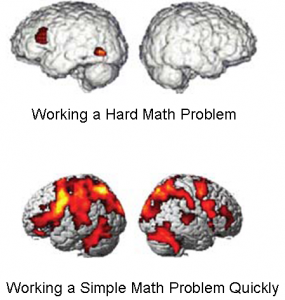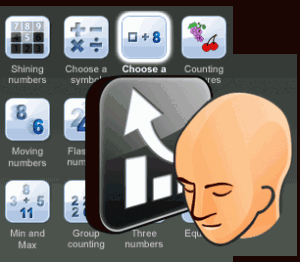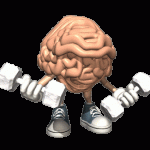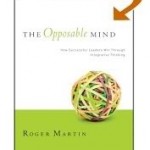Doing Simple Math Fast is a Major Brain Stimulant
 Doing simple calculations (3 + 5 = ?) very fast is becoming a popular brain training technique. It was pioneered by Dr. Ryuta Kawashima a Neuroscientist from Japan. He is well-known for the book Train Your Brain: A Better Brain in 60 Days, and BrainAge the Nintendo-based brain fitness system that we have covered on the Next Brain Blog before.
Doing simple calculations (3 + 5 = ?) very fast is becoming a popular brain training technique. It was pioneered by Dr. Ryuta Kawashima a Neuroscientist from Japan. He is well-known for the book Train Your Brain: A Better Brain in 60 Days, and BrainAge the Nintendo-based brain fitness system that we have covered on the Next Brain Blog before.
Similar techniques are popping up in many other brain training games and programs, especially those designed for mobile phones. For example, check out the Brain Blast Trainer series of iPhone apps.
The question is, does a daily dose of rapid mental mathematics improve your cognition, and if so in what way?
I have not been able to find literature that deals with this question. Dr. Kawahima’s research however, seems to clearly indicate (see figure) that doing simple math calculations rapidly stimulates the brain far more than doing hard math problems. Working the brain hard, like working a muscle hard should make it “bigger and stronger”.
I would like to hear from readers that use simple math as part of their brain fitness workout.
Source: Brain scanning images adapted from BrainAge Instruction Booklet
Categories: Books, Cognitive Decline, Problem Solving, Software, Training Tags: cognitive fitness, games
Does Asking Why Make You Smarter?
 Perhaps not but asking why five times in a row is a simple and proven technique for getting to the root cause of a problem or issue. And getting to the root cause greatly improves your odds of finding good solutions.
Perhaps not but asking why five times in a row is a simple and proven technique for getting to the root cause of a problem or issue. And getting to the root cause greatly improves your odds of finding good solutions.
The technique known as the five-whys was originally developed by Sakichi Toyoda, often called the father of the industrial revolution in Japan. Let’s assume for example that a customer order is not shipped from the dock on time. Here is how the technique works:
- Why1: Why did the shipment not leave the dock on time?
- The order was not completed before the last truck left
- Why2: What the order not complete?
- The automated assembler on line 3 broke down
- Why3: Why did the automated assembler break down?
- We failed to complete the maintenance schedule and the the control froze
- Why4: Why did we fail to complete maintenance?
- Frank, a new employee forgot to do it
- Why5: Why did Frank forget to do it?
- It was not included in his new employee training
Although a bit simplistic it shows the power of the five-whys technique for driving thinking to the root cause. A problem with a customer order was ultimately caused by a fault in new employee training. Learning such simple techniques is a powerful way to improve cognition and so they will be a frequent topic on the Next Brain Blog.
For a more detailed overview, including some of the short comings of the technique check out How to use the Five WHY approach.
Please post a comment and share your success with the five-whys or related problem solving techniques.
Source: Image of the Hand.
Categories: Problem Solving, Training Tags: quality technique
DASH Diet + Aerobic Exercise = 30% Improvement in Brain Function
 According to a news release by the American Heart Association, a diet developed to improve blood pressure combined with aerobic exercise over a four month period appears to improve the mental functioning of older overweight adults. Researchers claim mental functioning improved by 30%. Quoting the news release:
According to a news release by the American Heart Association, a diet developed to improve blood pressure combined with aerobic exercise over a four month period appears to improve the mental functioning of older overweight adults. Researchers claim mental functioning improved by 30%. Quoting the news release:
“Researchers assessed mental functioning with a battery of neuropsychological tests, including Executive Function-Memory-Learning and Psychomotor Speed. These tests measure cognitive skills involving manipulation of ideas and concepts and planning ahead. The tests were given before and after the four-month treatment program.”
The diet plan is called DASH (dietary approaches to stop hypertension) and involves:
- Eating more fruits, vegetables, whole grains, fish, poultry, nuts and foods rich in magnesium, potassium, and calcium
- Cutting back on red meats high total-fat foods and sweets
If you want to give it a try there are specific guidelines, recommendations and even food plans on The Dash Diet Plan Eating site.
The aerobic exercises were basic but supervised and took place for 30 minutes three times per week.
It is important to note that you have to do both the diet and exercise to get the improvement in mental functioning. Control groups that did one or the other, or nothing showed no improvement in mental functioning. These type of combination effects (doing two or more interventions to get a boost in cognitive performance) are common and will be frequently covered on the Next Brain Blog.
Source: Exercise and Diet Image
Categories: Cognitive Decline, Diet, Executive Function, Lifestyle, Memory and Learning, Older Adult, Other, Problem Solving Tags: exercise, fruit
Grow Smarter While Having Fun
 Brain games are all the rage. These are games you play for fun on your PC, game console or phone that also improve your cognitive functioning. There are dozens of traditional games and more recently scientifically-designed games that aim to improve memory, processing speed, visual perception, problem solving skill, mental focus and many other aspects of cognitive performance.
Brain games are all the rage. These are games you play for fun on your PC, game console or phone that also improve your cognitive functioning. There are dozens of traditional games and more recently scientifically-designed games that aim to improve memory, processing speed, visual perception, problem solving skill, mental focus and many other aspects of cognitive performance.
Do they work? Scientific American published an interesting article that took on that very question. What they found was many (50 or so) studies that show brain games can improve task performance but few if any that show that the effects translate into improvements in everyday cognitive activities. But they are optimistic:
One thing remains clear: there is no serious harm to brain training other than the effect on your wallet (and the risk of some egg on your face if your seven-year old can play them better). And evidence is accumulating that they not only improve the skills they are designed to help, but likely generalize to other cognitive abilities and have some long-lasting benefits.
Given this, games will be a frequent topic in the Next Brain Blog.
Another question to ask is are they fun? I’ve tried many of the scientifically designed brain games and find them boring after a couple of plays. Fortunately, some traditional games and puzzles also offer some cognitive performance boosts. For example, the popular math puzzle Sudoku is included in BrainAge, a brain training program pack with games that runs on a Nintendo DS handheld video game device.
The key is to find brain games that are truly fun for you and that have evidence supporting claims of cognitive improvement.
Here are some links to get your search started:
- Scientifically Designed Brain Games by Lumosity
- Top 50 Brain Teasers and Games by SharpBrains
- Top 10 Websites for Brain Training
Please post a comment on your favorite game that has brain boosting effects.
Source: Image of Resco Brain Games
Categories: Memory and Learning, Mental Focus, Perception, Problem Solving, Software Tags: brain training, games
Use Your Body to Improve Thinking Instantly!
 Over the last 20 years scientists have made good progress in understanding how our bodies impact the way we learn, think, solve problems manage emotions and do other mental tasks. A new view has emerged called embodied cognition that argues how our minds work is strongly determined by how our bodies interact with the world.
Over the last 20 years scientists have made good progress in understanding how our bodies impact the way we learn, think, solve problems manage emotions and do other mental tasks. A new view has emerged called embodied cognition that argues how our minds work is strongly determined by how our bodies interact with the world.
Embodied cognition has practical implications for improving cognitive performance and will be a frequent topic on the Next Brain Blog. For example, taking simple actions such as literally stepping back when faced with a tough problem or more complex actions such as taking a walk lead to better results.
This is an exciting result because it shows a very simple actions can immediately improve the performance of our minds and brains!
Talking and thinking with our hands, how we sit or hold our arms (body posture) and any sort of short-duration physical activity have all be shown to improve various aspects of thinking, problem solving and learning.
Take for example the 2007 study that was recently blogged about as, Unravel Problems by Folding Your Arms, in Psychology Today. The idea that folding your arms could in fact help you solve hard problems may seem a bit simplistic but there is some neuroscience behind it:
“Crossing our arms, Friedman and Elliot argued, sends our a brains a “proprioceptive cue.” “Proprioception” is the scientific term for our perception of the relative position of our body parts. When our arms are crossed it tells the brain to buckle down and get ready to work through a difficult problem. So next time you’re faced with a protracted project or a tough task, cross your arms to see it to a speedy, successful conclusion. Just remember, while our brains perceive crossed arms as a sign of perseverance, others may perceive it as a sign of boredom. Body language can mean many different things to different people in different situations-it’s part of what makes the field so exciting!”
If you are still skeptical watch the highly effective problem solvers around you. What do they do with their bodies when they are stumped?
Source: Image adapted from Moving Bodies.
Categories: Lifestyle, Memory and Learning, Problem Solving Tags: embodied cognition
Morning Pages will Boost Your Creativity
 Individual creativity or the mental ability to generate new and relevant ideas on-demand is a highly prized skill. Although creativity is not fully understood there are many proven techniques we can use to improve it. Creativity will be a frequent topic on the Next Brain Blog.
Individual creativity or the mental ability to generate new and relevant ideas on-demand is a highly prized skill. Although creativity is not fully understood there are many proven techniques we can use to improve it. Creativity will be a frequent topic on the Next Brain Blog.
A great way to get started in developing your creativity is to work through a self-paced program such as The Artist’s Way. A primary technique the book teaches is called the Morning Pages.
“Morning Pages are three pages of longhand, stream of consciousness writing, done first thing in the morning. There is no wrong way to do Morning Pages– they are not high art. They are about anything and everything that crosses your mind– and they are for your eyes only.”
Doing this teaches your brain how to flow, initially without any specific purpose. But it is the first step. Much like “just start running” would be a first step in training for a foot race.
Doing Morning Pages for at least three months should produce a noticeable change in your capacity to think creativity.
For more detail on the Morning Pages and a second technique check out Basic Tools. This is a 16-page 8.5M PDF file.
If you have been using Morning Pages or other writing-based creativity techniques please leave a comment and share your experiences and results.
Categories: Books, Problem Solving, Training Tags: creativity
Critical Reasoning Sharpens the Mind But Takes Mega Effort to Develop
 Thinking or reasoning critically is a key cognitive skill. It means we know how to question assumptions, see the logic or lack of logic in an argument, draw sound conclusions from evidence, find root concepts and causes, generate possibilities systematically, avoid decision traps and cognitive biases, see things from multiple points of view and otherwise rigorously deal with ambiguity.
Thinking or reasoning critically is a key cognitive skill. It means we know how to question assumptions, see the logic or lack of logic in an argument, draw sound conclusions from evidence, find root concepts and causes, generate possibilities systematically, avoid decision traps and cognitive biases, see things from multiple points of view and otherwise rigorously deal with ambiguity.
Critical thinking is so important that it has been a major area of focus since the time of the ancient Greek philosophers. But it is not just a philosophical thing. For example, in a recent post on the Harvard Business Review’s blog How Leaders Should Think Critically, the authors argue that it is a fundamental skill for today’s business leaders and students. Of course the same arguments apply to non-business school students and leaders as well as everyone trying to make their way in today’s complex society.
In short, enhancing critical thinking is an important option for anyone interested in building a sharper mind and will be a regular topic on this blog.
But how can you improve it? Self-study using a book or web resource is a good way. I’ll make a couple of recommendations below. You can also scout out a class or seminar at a location near you. For those who like a more guided approach, you can contract the services of a tutor or philosophical counselor.
No matter how you start please be sure to share your experiences with other readers of this blog.
For a good introductory text on critical reasoning see, Thought and Knowledge: An Introduction to Critical Reasoning. It is relatively inexpensive, easy to read and covers basic and advanced topics. It has a more psychological than philosophical orientation and provides nice chapter summaries. You can access it online on Questia here.
For a very comprehensive free treatment, check out Critical Reasoning a User’s Manual (version 3.0). It is a 640-page (3 MB) PDF. It is also available online in the document reader Scribd here.
Both these resources will take an enormous effort to get through! If you are aware of a better general introduction please comment on this post. In the meantime, I will blog on specific techniques that you can use to build critical reasoning skills with much less effort.
Categories: Ancient Ways, Books, Decision Making, Problem Solving, Training Tags: critical reasoning, critical thinking
Do You Have You Membership to a Brain Gym?
 Over the last five years dozens of companies offering software to “train your brain” have sprung up. The software is often a structured time-based test or some form of a game. It can run on your PC , game console or even your smart phone. The idea is to give your brain a work out much like going to a gym. To see a brain working out click on the image to your right.
Over the last five years dozens of companies offering software to “train your brain” have sprung up. The software is often a structured time-based test or some form of a game. It can run on your PC , game console or even your smart phone. The idea is to give your brain a work out much like going to a gym. To see a brain working out click on the image to your right.
But what are they proven to do for your brain? Many claim to improve memory, visual perception, planning and help avoid cognitive decline as we age. Most have studies that show you will improve on the tasks in the software but what is less clear is if that transfers to doing similar cognitive tasks in other setting such as those in daily living or at work.
Brain or cognitive training software is rapidly advancing and will be a regular topic on this blog. There is little doubt that it is an important tool for building YourNextBrain!
![]() To give brain fitness software a try, click on this demo of the Personal Coach from CogniFit (you may need to scroll down the page and click the demo button). To get a better understanding of how CogniFit approach brain training works watch a 3-minute video of why it is effective.
To give brain fitness software a try, click on this demo of the Personal Coach from CogniFit (you may need to scroll down the page and click the demo button). To get a better understanding of how CogniFit approach brain training works watch a 3-minute video of why it is effective.
I am not endorsing the CogniFit product just offering it as an example. If you are interested in this type of technique for building YourNextBrain! comment on this post and I will reply with a list of leading vendors and products.
Looking forward to hearing about your experiences at the brain gym.
———————————————————————————————–
Source for image above of brain exercising can be found here.
Categories: Memory and Learning, Other, Perception, Problem Solving, Software, Training Tags: brain fitness, brain gym, brain training, cognitive fitness
Use Integrative Thinking to Crack Hard Problems
 There are literally dozens of methods you can use to solve problems. We will try to cover all of them in this blog. The latest crop are driven by the idea that we can become better problem solvers if we learn to think like professionals that are really good problem solvers. Makes sense. For example, in design thinking we try to think like a successful designer or in leadership thinking we try and think like a highly effective leader.
There are literally dozens of methods you can use to solve problems. We will try to cover all of them in this blog. The latest crop are driven by the idea that we can become better problem solvers if we learn to think like professionals that are really good problem solvers. Makes sense. For example, in design thinking we try to think like a successful designer or in leadership thinking we try and think like a highly effective leader.
One approach to think-like-a-leader that has worked for me comes from the Rotman School of Management at the University of Toronto. It is called integrative thinking. In essence it is:
“the ability to constructively face the tensions of opposing models, and instead of choosing one at the expense of the other, generate a creative resolution of the tension in the form of a new model that contains elements of the individual models, but is superior to each. “
Easy to say but hard to do. The payoff however can be enormous as this often used quote by F. Scott Fitzgerald suggests:
“The test of a first-rate intelligence is the ability to hold two opposing ideas in mind at the same time and still retain the ability to function”
In the language of this blog integrative thinking is an important option for building Your Next Brain!
 To dig deeper check out the book, The Opposable Mind: How Successful Leaders Win Through Integrative Thinking. You can get a free preview of the book here. Or if you have more money to spend and want some personal training consider the 3-day executive program in Toronto this April. I will blog on my experiences later. Meanwhile please share your ideas and experiences with integrative thinking techniques.
To dig deeper check out the book, The Opposable Mind: How Successful Leaders Win Through Integrative Thinking. You can get a free preview of the book here. Or if you have more money to spend and want some personal training consider the 3-day executive program in Toronto this April. I will blog on my experiences later. Meanwhile please share your ideas and experiences with integrative thinking techniques.
Categories: Books, Decision Making, Executive, Leader, Problem Solving, Training Tags: cognitive dissonance, integrative thinking
